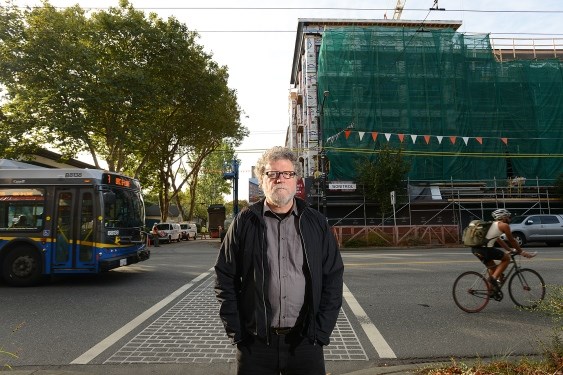The Coalition of Vancouver Neighbourhoods says it’s “disappointed” by remarks Mayor Gregor Robertson made last week during a livestreamed interview with the Courier.
In a series of questions, Robertson, who’s running for a third term as mayor, was asked about the numerous lawsuits lodged against the city by residents, criticism about the city’s consultation efforts, as well as his thoughts about the coalition. The coalition, which is comprised of 25 resident groups, has drafted a principles and goals document that talks about a more collaborative relationship between the city and neighbourhoods in terms of planning and development.
Questions to Robertson included:
Courier: [Members of the coalition] don’t feel they’ve been listened to, and they want to influence planning and development. So what do you say to groups like that? Will you endorse their goals and principles document? Because [we] know they’ve asked Vision and Vision so far hasn’t.
Gregor Robertson: Again, there is a lot of politics at work in that, and people have different opinions about growth. Quite a few of the, I think, members and associations are not supportive of growth. Or they’re supportive of very little growth. Certainly not enough to deal with the pressure that we’re facing. The only way to address affordability in Vancouver is to add density and to try and get savings through using city land or rezonings. We don’t really have a lot of choices here. So there are residents and associations and neighbourhoods that speak out, and I appreciate that. It’s great that they are presenting that view. I still believe that most people in Vancouver, the majority of people, understand we have to add more density and more housing, more business opportunities in the city. We try and do that as thoughtfully and carefully as we can, with an open process. And there’s always going to be some disagreement about that. But we certainly have loud voices from some neighbourhoods and certain people who have organized that.
Courier: Do you think then that group is completely politically motivated? And again, [we’re] assuming from your comments that you’re not going to sign — or endorse their document. Can you explain that.
Gregor Robertson: Well, I think it’s a mix. Obviously not everyone there is politically motivated. But I certainly know a number of them who are regulars at city hall or have been — campaigned against me in the last election under the Neighbourhoods for [a] Sustainable Vancouver party. So there’s a mix. I’m not going to say it’s all political. But there’s a mix of politics there. And yeah, I think the principles — I think many of them are worthy. But overall it’s not — it doesn’t align with the city’s existing policy and where I believe we need to go to address affordability.
Larry Benge, one of the coalition’s spokespeople, rejects the notion that Neighbourhoods for a Sustainable Vancouver (NSV) is a driving force behind the coalition.
NSV formed as an advocacy group in 2007 before becoming an electoral organization in 2011. It ran several candidates for office. Randy Helten ran for mayor under NSV, while Nicole Benson, Marie Kerchum, Terry Martin and Elizabeth Murphy ran as council candidates. None were elected.
Benge said that only three NSV members (one who ran for office — Elizabeth Murphy) are reps on the 25-member coalition.
“To kind of imply that the Coalition of Vancouver Neighbourhoods was either originally organized by NSV or is currently strongly affected by NSV is misleading,” he said. “Because it was not organized by members of NSV — three of 25 reps are members of NSV or were. That’s three out of 25. They certainly don’t have a controlling interest in the group. They certainly don’t have a dominant ability to steer the group.”
Benge added that its members speak for non-partisan resident groups. “They are not speaking for political groups,” he said.
Benge also objects to any suggestion that members aren’t supportive of growth. “Most of what we object to is that density seems to be imposed on neighbourhoods instead of discussed with neighbourhoods and it’s an ongoing problem,” he said.
But Benge agrees with one of Roberton’s points.
“Basically, [Robertson] said our principles and goals [document] doesn’t align with current city policy. And we totally agree because current city policy doesn’t promote collaborative relationships with neighbourhoods. That’s one of the main points we’re trying to make. That’s why so many communities and neighbourhoods are angry and that’s why there have been so many [law]suits in the courts. Because people and groups are frustrated with the lack of a process and so they see the courts as their only recourse.”
The Coalition of Vancouver Neighbourhoods says it's a non-partisan group and it will not endorse slates, parties or candidates in the civic election.
Neighbourhoods for a Sustainable Vancouver, however, unveiled a “suggested ballot card” Nov. 5, which includes a mixed slate of candidates from the NPA, COPE, Greens, Cedar Party (one for Cedar as an option for council), but none from Vision Vancouver. For mayor, it suggests the NPA’s Kirk LaPointe or COPE’s Meena Wong.
Neighbourhoods for a Sustainable Vancouver is a registered third-party sponsor for the 2014 election.


